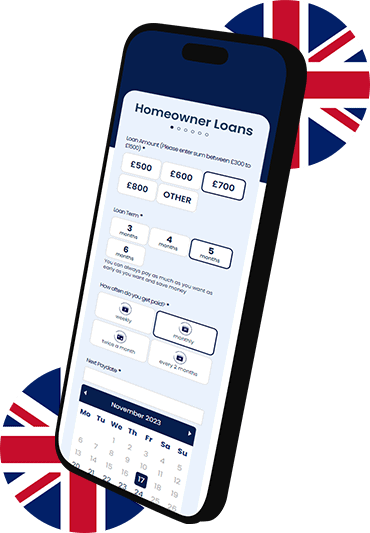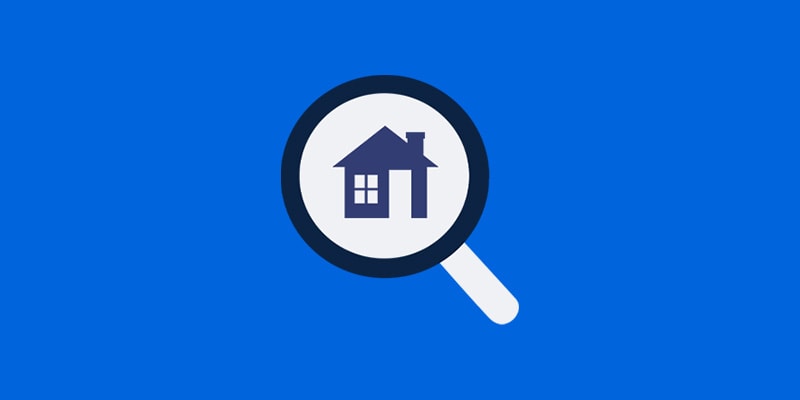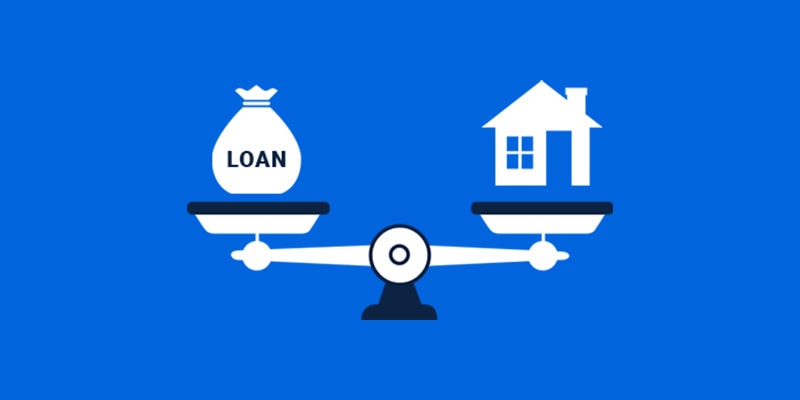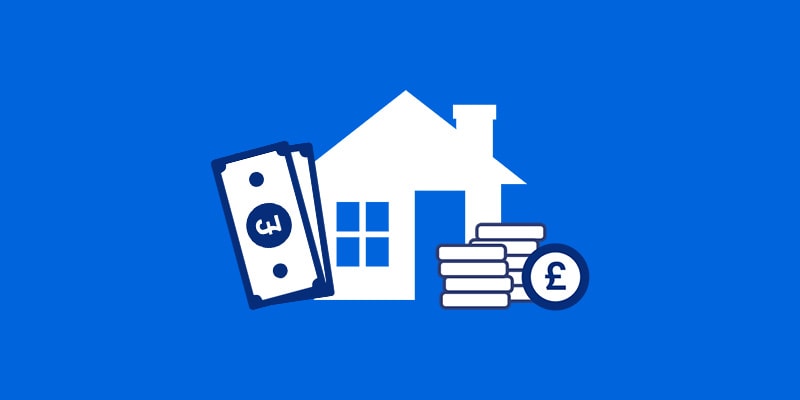Homeowner loans
Are you a homeowner seeking a loan? Homeowner loans, also known as secured loans, might be the ideal solution for you. Leverage the equity in your home to borrow between £5,000 to £1,500,000.

Understanding how homeowner loans work
A homeowner loan allows you to use the equity you own in your home as collateral to secure a loan. Offering home equity as security greatly increases your chances of loan approval, even if you have a mortgage or a low credit score. Let’s break down how this type of loan works.
Example of how a homeowner loan works:
You have a house valued at £200,000, and there’s a remaining mortgage balance of £125,000. The difference, known as ‘equity,’ amounts to £75,000. This equity becomes the foundation for a Secured Loan. If a lender offers a 90% Loan-to-Value (LTV) ratio, they could comfortably approve a loan of up to £180,000 for you. After subtracting the existing mortgage of £125,000, you might be looking at a potential loan amount of £55,000.

What can a homeowner loan be used for?
You can use homeowner loans for almost anything. Here’s the 8 most common things borrowers use them for:
Renovate your home
Purchase a new vehicle
Pay for education
Start a business
Invest in your business
Any type of large purchase
Consolidate your debts
Purchase other assets
How to apply for a homeowner loan
Follow these three steps:

Complete online application
Submit the homeowner loan application with only the bare minimum of information including income, desired loan amount, home value, remaining mortgage, and loan duration.

Partner lender search
Our partner will evaluate a list of suitable homeowner lenders based on the details provided in your application, aiming to find lenders whose loan offerings are most compatible with your financial circumstances.

Receive loan offer
Our partner will share loan offers from lenders, with amounts ranging based on your credit history, financial situation and the amount of equity you have in your home.

Am I eligible
for a homeowner loan?
To be eligible for a homeowner loans, you should meet the following criteria:
Must live in the UK
Be at least 18 years old
Own a home
Have equity in home

Homeowner loans are suitable for people with a full-time salary own a home. If your income is mainly from part-time work or social benefits, passing the affordability assessment that confirms you can afford a loan without causing you undue financial distress may be difficult.
Homeowner tips from finance experts
Homeowners tip from Pat Harding
“When considering a secured loan, take the minimum you need and not the maximum you can get. it would save you money and help you build a better credit rating.”

Pat is a former UK high street bank employee of 25 years who writes amazing and helpful articles for familymoney.co.uk.
Homeowners tip from Thomas Henderson
“Home extensions and improvements can increase the value of your house. The increased value will allow you to borrow more money in the future or refinance your house to save a lot of money.”

Thomas worked as a consultant in personal finance in the UK for 18 years. He has found a passion in sharing his experience on familymoney.co.uk.
Homeowners tip from Megan Walsh
“Avoid short term high-cost vicious circle with a secured loan. Unsecured loans are expensive and very stressful. Never take a short term loan to cover an existing payday loan. Secured loans can put you back on track.”

Megan, a former employee of over 20 years in the insurance industry, is devoted to sharing her valuable insights on familymoney.co.uk.
Homeowner tip from Jeremiah
“A good debt-to-equity ratio is important when considering a home equity loan. The better your debt-to-equity ration the easier it is to secure better secured loan terms and interest rates and larger loan amounts”

Jeremiah, an experienced financial consultant, shares his valuable insights on familymoney.co.uk.
Homeowner Loan Application Form
Fields with (*) are required
Advantages and disadvantages of homeowner loans
When considering a homeowner loan, it’s important to weigh both their benefits and potential drawbacks.
Advantages
- You will enjoy lower interest rates: As a homeowner, you’ll typically benefit from lower interest rates compared to unsecured loans
- You can access larger loan amounts: Your status as a homeowner allows you to borrow more substantial sums of money
- You don’t need a guarantor: You can secure the loan using your property, eliminating the need for an additional guarantor
- You can improve your credit score: By making timely repayments, you are likely to see an improvement in your credit rating
Disadvantages
- You will be in debt for a long period: You’re committing to a long-term financial obligation that might last several years.
- Your credit score could suffer for missed payments: Failing to keep up with repayments can negatively affect your credit score.
- Your flexibility to move or sell can be limited: The loan might restrict your ability to sell or move from your property until it’s paid off.
- You risk losing your home: If you fail to make repayments, there’s a real risk of losing your property.
Homeowner loans in the UK – The scope trend and risks
FamilyMoney Experts examined numerous authoritative sources in the UK to bring you the most important statistics related to homeowners’ loans in the UK. These statistics highlight UK homeowners loans scope, trends, and potential risks. Please note that some of the exact numbers might vary due to continuous changes in the financial market.
UK homeowners loans scope, trends, and potential risks
- Total volume of homeowner loans: The total outstanding value of all homeowner loans. £1.5 trillion.
- Average loan amount: The average loan amount taken by a homeowner in the UK was £30,000 (2022)
- Number of outstanding loans: The number of ongoing homeowner loans in the UK is 11.1 million (Q3, 2022)
- Default rate: The percentage of homeowners who failed to make loan payments is 1.25% (Q4, 2022)
- Interest rates: The average interest rate charged on homeowner loans was 2.9% (2022)
- Loan-to-value (LTV) ratios: The ratio of the loan amount to the appraised value of the property. Average max LTV: 75% (2022)
- Growth in loan amounts: The increase in homeowner loan amounts over time was a 3.9% increase (2020 to 2021)
- Purpose of loans: The main reasons homeowners take out loans are: Home improvement: 61%, Debt consolidation: 28%, Other purposes: 11% (2022)
- Equity release: A report by the Equity Release Council showed that around 76,154 new and returning customers opted for equity release, amounting to over £3.89 billion. The Telegraph’s Article on “Mortgages and home.” explains this topic in simple language.
Resources we used to bring you the key facts:
Bank of England: The UK’s central bank regularly provides vital financial statistical information and reports on homeowner loans and mortgages in the United Kingdom.
UK Finance: A trade association for the UK banking and financial services sector. It provides comprehensive data and statistics related to UK finance.
Office for National Statistics (ONS) The UK’s largest independent producer of official statistics. It provides a wide range of economic, social and demographic statistics.
How we help you?
Paydayloansonline.co.uk has been a direct lender of unsecured loans ranging from £300 to £1,500 since 2016. Now, we’re committed to helping you secure a loan using your home’s equity. We’ve carefully selected trusted secured loan partners willing to offer larger sums, ranging from £5,000 to £1,500,000.
Here’s why you should use this service:
- All credit histories considered
- Check your eligibility without impacting your credit score.
- Save time try finding the perfect loan deal.
You can learn more about PaydayLoansOnline on our about us page.

Our company details
Our company registration number is 7581337, and our headquarters are located at Office 9, 2A Highfield Avenue, London, NW11 9ET, United Kingdom.
FCA and regulation details
Since 13/05/2016 we have been fully authorised and regulated by the Financial Conduct Authority (FCA). Our FCA full permission license is 714479.
ICO registration details
We are also registered with the Information Commissioner’s Office (ICO), registration number Z3305234.
Our customer service team are ready to help you
Although the secured loans and homeowner loans on offer are managed by our trusted loan partner our team is available to assist you from 9 am to 5:30 pm, Monday to Friday if you have any more questions about these secured loan offerings.
You can reach out to us in the following ways during our office hours:

Call us at 020 3757 1933 Between 9 am and 5 pm, Monday to Friday.

Send us an email at
support@paydayloansonline.co.uk between 9 am and 5 pm,
Monday to Friday.

Visit our office at
Office 9, 2a Highfield Avenue, London NW11 9ET
during our office hours.
Frequently Asked Questions
A homeowner loan allows individuals to borrow money by using their property as collateral. In the event of non-payment, the lender can take possession of the property to recover the loan amount.
These loans operate by leveraging the equity in a property. Borrowers secure a set amount, backed by their home, and repay it over an agreed-upon period with interest. Lower interest rates are typical due to reduced risk for the lender.
The borrowing amount depends on the value and equity of the property. Lenders offer loans ranging from thousands to hundreds of thousands of pounds, depending on the debt to equity ratio in your property.
These loans are versatile and can be used for various purposes, including home improvements, debt consolidation, educational expenses, or other financial needs.
Costs associated with these loans encompass interest rates, fees, and the total amount repayable over the loan term. Interest rates are generally lower compared to unsecured loans.
Alternatives to these loans include personal loans, unsecured loans, and remortgaging, depending on an individual’s financial situation and specific needs.
It may be more challenging for individuals with bad credit to get a homeowner loan, but some lenders specialize in secured loans with based credit. However, interest rates might be higher.
Home equity represents an individual’s true ownership in a property and is calculated by deducting the mortgage balance from the property’s market value. The loan amount depends on the available equity in the property.
Yes, even with an existing mortgage, your home can still be used as collateral to secure this type of loan, subject to approval from your mortgage lender, creating a secondary charge on your property.
Homeowner loan resources
Check out our helpful guides and articles on using the secured loans



